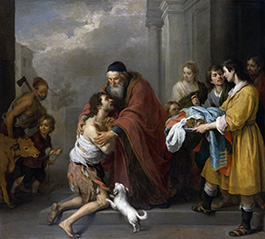Coming to Yourself
- JOHN CUDDEBACK
"I must first know myself, as the Delphian inscription says…" - Socrates, in Plato's Phaedrus
 "But when he came to himself…" - The Prodigal Son
"But when he came to himself…" - The Prodigal Son
Today I received an email from a student. He shared with me a moment of self-discovery. In class he had seen something important about himself — something hard to recognize, and to admit. I was very grateful to receive that email. Indeed, it reminds me of reasons for great hope.
There is so much misunderstanding, posturing, and outright deception perpetrated all around us, and probably within us too. Yet, if we really look, people are also seeing the light, and changing their lives for the better. For instance, across the country young people are marrying and looking for something more. They want to receive the gift and live in the truth of marriage and household. And they are willing to reckon with their own ignorance, shortcomings, and failures. This is not in the news; I see it with my own eyes.
The Greeks saw the challenge and central importance of coming to know oneself. In Plato's Philebus we read, "Happy would the wise man be if he knew all things, and the next best thing for him is that he should know himself." Self-knowledge surely implies two things, something general and something particular. First, we need to know the gift and the call to a truly human life — this we share with all human persons. Second, we need to know where we are in our own journey. It requires humility, courage, and effort to discover these great truths; and likewise, to live according to them.
In the prodigal son, a story at the center of Western Civilization, one key line stands out at the heart of the drama. In Latin it is but four words: "in se autem reversus." Literally, "But having returned into himself…" Somehow, his eyes were opened, and he saw. Himself. Scales drop. What am I doing here? This is not where I belong. This is not who I am.
And thank God, when he saw this and started to move, someone else — who had seen it all along — was waiting; waiting to affirm him. "Yes indeed! That is not who you are."
Sometimes we have the duty, nay the privilege, of remembering for a loved one something that he does not remember. Not yet. So we hold it in memory for him. And we wait, ready to affirm, ready to see together, and to grow together.
An old favorite folk song, The Dutchman, tells of elderly man and his wife Margaret. In some sense he has lost his mind and his memory. Yet the beautiful refrain has him say:
Long ago, I used to be a young man
And dear Margaret remembers that for me.
Dear Margaret! There are different kinds of forgetting and remembering. In each our paths are interwoven.
At times in our discouragement for a wayward loved one, we let ourselves fall into the trap of saying "yes, I suppose that is who you really are." Somehow, we can live in the truth of where a person is now, while not losing sight of where the person should and can be. We can do this for them. We can also do it for ourselves.
There is always room to return to ourselves. And when we do, we might just discover that someone is coming to meet us. And he's running.
 This is Meaghen Gonzalez, Editor of CERC. I hope you appreciated this piece. We curate these articles especially for believers like you.
This is Meaghen Gonzalez, Editor of CERC. I hope you appreciated this piece. We curate these articles especially for believers like you.
Please show your appreciation by making a $3 donation. CERC is entirely reader supported.

Acknowledgement
 John A. Cuddeback. "Coming to Yourself." LifeCraft (March 30, 2022).
John A. Cuddeback. "Coming to Yourself." LifeCraft (March 30, 2022).
Reprinted with permission from the author, John A. Cuddeback. Image credit: Bartolomé Esteban Murillo, Public domain, via Wikimedia Commons.
The Author
 John Cuddeback is professor of Philosophy at Christendom College and the author of True Friendship: Where Virtue Becomes Happiness and Aristotle's Ethics: A Guide to Living the Good Life. He and his wife Sofia consider themselves blessed to be raising their six children—and a few pigs and sundry—in the shadow of the Blue Ridge on the banks of the Shenandoah.
John Cuddeback is professor of Philosophy at Christendom College and the author of True Friendship: Where Virtue Becomes Happiness and Aristotle's Ethics: A Guide to Living the Good Life. He and his wife Sofia consider themselves blessed to be raising their six children—and a few pigs and sundry—in the shadow of the Blue Ridge on the banks of the Shenandoah.




